Main Theme: Climate Finance and Nature-based Solutions: An Ecohydrology Approach
November 25h – 29th, 2024: National Carbon Monitoring Centre - Sokoine University of Agriculture, Tanzania
Between 25h and 29th November 2024, the UNESCO Chair on Ecohydrology and Transboundary Water Management hosted at the Department of Geography and Environmental Studies, College of Natural and Applied Sciences (CONAS) of Sokoine University of Agriculture (SUA) organized the 7th International Training on Ecohydrology in Tanzania (Figure 1).

Figure 1: Group photo with the Guest of Honor, Dr Geofrey Karugila – Acting Deputy Vice Chancellor (ARC).
This event was conducted at National Carbon Monitoring Centre (NCMC), Sokoine University of Agriculture, Morogoro with the main theme: “Climate Finance and Nature Based Solutions: An Ecohydrology Approach”.
Key partners in this event were: UNESCO Dar es Salaam Office Tanzania, Sokoine University of Agriculture, UNESCO Chair on Ecohydrology: Water for Ecosystems and Societies - University of Algarve Portugal; Equiplus Company Limited - Integrated Engineered Solutions, Dar es Salaam Tanzania; Forest Sunset Hotel, Morogoro Tanzania, UNESCO Chair on Sustainable Management of Conservation Areas - University of Carinthia Austria and UNESCO Chair on Interreligious and Intercultural Dialogues, Water Sciences, Natural Resources and Ecosystems - ST. Andrew’s College of Arts, Science and Commerce, Bombay India.
While facilitators came from Austria, Portugal, Tanzania and Sweden, trainees were from Burundi, Democratic Republic of Congo, Kenya, Namibia, Rwanda, Tanzania, Tunisia and Uganda.
An overview
Our world faces many major environmental problems that cause reduction of ecosystem services essential for human survival and livelihoods. Among the problems include climate change (CC), biodiversity loss, watershed alteration, water and air pollution, deforestation, to name a few. These problems are affecting the capacity of watersheds and rivers to provide ecosystem services for human consumption and ecological integrity. Africa is probably the most vulnerable continent to CC and variability not only because of the dependence of many of its economies on agriculture, but also because of the presence of other environmental stresses.
In recent years, CC has posed a serious threat to human beings and the environment. Degradation of ecosystems is a phenomenon we are increasingly facing, calling for new solutions. Biodiversity loss and CC pose tremendous challenges to our planet and its people. Hundreds of millions of people are already exposed to the effects of biodiversity loss and CC. Restoring nature can help people to adapt by providing an ongoing source of food and other ecosystem services that support livelihoods, whilst also providing protection against extreme weather events. The nexus between climate finance, nature-based solutions and Ecohydrology is crucial for ecosystems restoration, resilience and sustainable supply of ecosystem services.
Objective of the training
To build the capacity of participants on climate finance, nature-based solutions and Ecohydrology for sustainable flow of ecosystem services and resilience under the changing climate.
Training content
This 7th training comprised of:
- Nature-based and Bankable Nature Solutions for Ecological Sustainability
- Climate Finance in Tanzania: Opportunities and Challenges for the Poor
- Application of Environmental Isotopes and Hydrochemistry in Water Resources Management
- Landscape Based Climate Finance Contribution to Achieving Net Zero Climate Goals
- Green Soil Hydrology Management and Healthy Soil for Plant Health in Agricultural Landscapes
- Theoretical and Practical Approaches to Systems Innovation in the Water Sector
- Leveraging EIA and SEA to Advance Ecohydrology in Climate Solution
- Innovative Tools and Strategies for Effective Conservation Area Management
- Unlocking Nature’s Secrets – Digital Twins, eDNA and AI in Nature Conservation – A Glimpse into the BioMONITec Project
- Holistic Management of UNESCO Designated Sites
- Basic Concepts of Climate Change, Causes and Impacts
- The Progress of INSTM in Establishing the Ghar El Melah Lagoon as a UNESCO Ecohydrology Demosite in Tunisia
- Introduction to the Concept of Ecohydrology: Types of Solutions
- Introduction to French Language for Beginners II
A total of 39 trainees (25 females and 14 males) comprising of BSc, MSc, PhD students from academic and research institutions, NGOs and the private sector attended this 7th Ecohydrology training.
Highlights of the training
Before the opening speech, the Guest of Honor, the Acting Deputy Vice Chancellor (ARC) who is also the Principal of the College of Natural and Applied Sciences (CONAS) Dr. Geofrey Karugila gave the welcome remarks and an overview about SUA and CONAS (Figure 2).
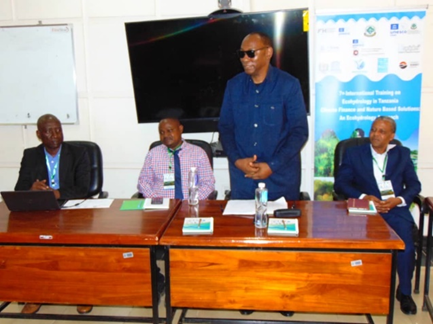
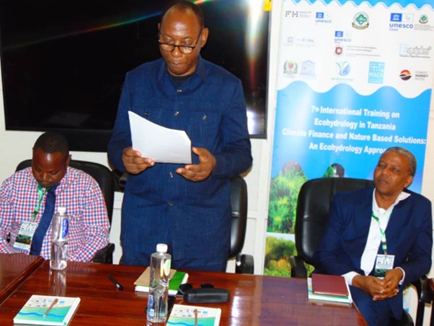
Figure 2: The Guest of Honor, Acting Deputy Vice Chancellor (ARC) Dr. Geofrey Karugila giving welcome remarks and the opening speech
The Guest of Honor advised trainees (particularly students) to take the training seriously for their future career, sustainability of nature and ultimately sustainable flow of different ecosystem services. Furthermore, he emphasized on the importance of climate finance, carbon credit and green technologies in order to offset the effects of greenhouse gases and climate change.
On nature-based solutions, the Guest of Honor said “I am pleased to let you know that Ecohydrology is a new paradigm shift as nature-based solution for environmental sustainability. The use of nature-based solutions entails the use of biological approaches for maintaining the ecological functions of natural ecosystems”.
He urged further that, “Different natural ecosystems are facing dramatic degradation due to rampant human population increase, climate change and variability and unsustainable anthropogenic activities, thereby resulting in significant reduction of ecosystem services. Therefore, nature-based solutions are there to stay so as to reverse the current environmental degradation”.
This training was facilitated by Dr. Raphael Madege, Ms. Elisabeth Wiegele, Prof. Luis Chicharo and Dr. Erik Brattström, Dr Enock Chambile, Mr. Keven Robert, Dr Emmanuel Mwainunu and Dr. Makarius C.S. Lalika (Figure 3).
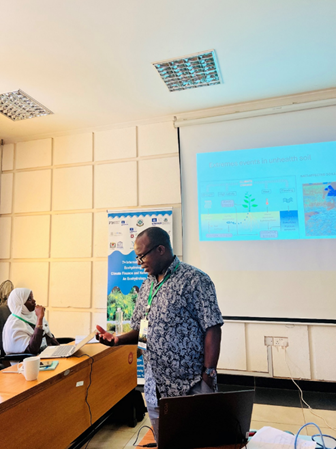
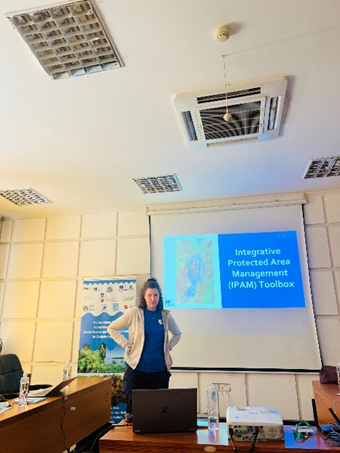
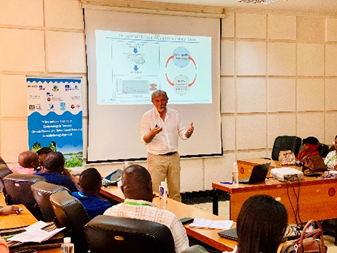
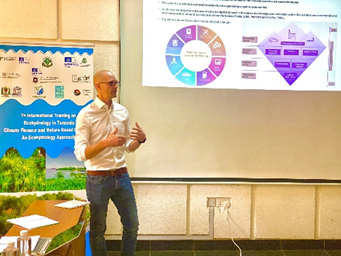
Figure 3: Facilitators presenting during the 7th Ecohydrology training
During the practical sessions, Ms. Elizabeth Wiegele, Ms. Vanessa Berger and Erik Brattström, were instrumental for giving guidance to trainees (Figure 4).
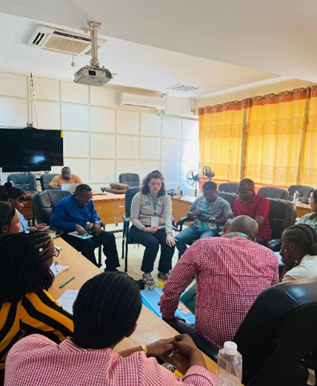
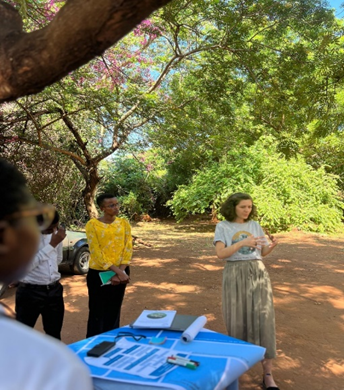
Figure 4: On-going practical sessions
On November 29, the Dr. Emmanuel Mwainunu (Country Programme Coordinator for Wetland International – Tanzania Office) officiated the closing ceremony of this 7th Ecohydrology training (Figure 5).
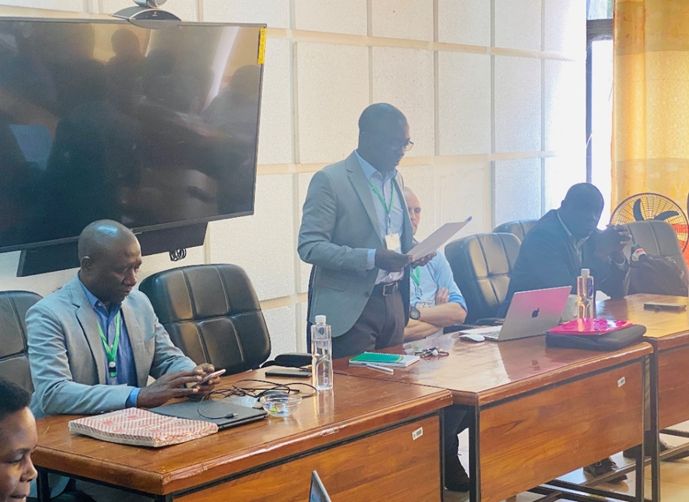
Figure 5: Dr. Emmanuel Mwainunu delivering the speech during the closing ceremony
Dr. Mwainunu urged trainees to make use of Ecohydrology for enhancement of sustainable flow of ecosystem services. He said that the theme of this 7th training i.e. Climate Finance and Nature-based Solutions highlights two crucial aspects of environmental management:
- Nature-based Solutions: Entailing the use of biological approaches for maintaining the ecological functions of natural ecosystems.
- Climate Finance: As a vital enabler aimed at providing the resources needed to scale these solutions and address the impacts of greenhouse gases on our planet.
Furthermore, he said that “the combination of Nature-based Solutions and Climate Finance creates a powerful framework to mitigate climate impacts while ensuring ecosystem sustainability. In this context Ecohydrology is considered as a new paradigm shift as Nature-based Solution for environmental sustainability as indicated in the training theme”.
Thereafter, trainees received certificate of attendance (Figure 6)
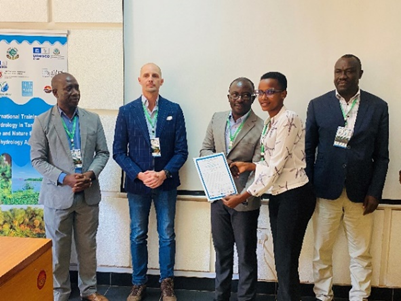
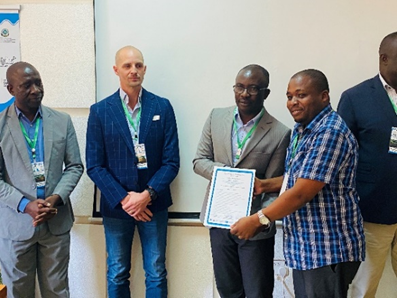
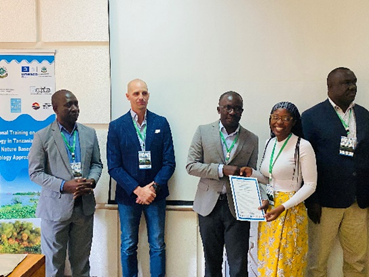
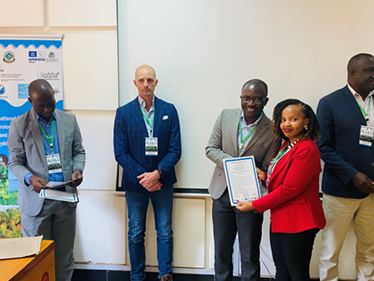
Figure 6: Dr. Emmanuel Mwainunu presenting certificates during the closing ceremony
Below are some of the pictures of the 7th training (Figure 7)
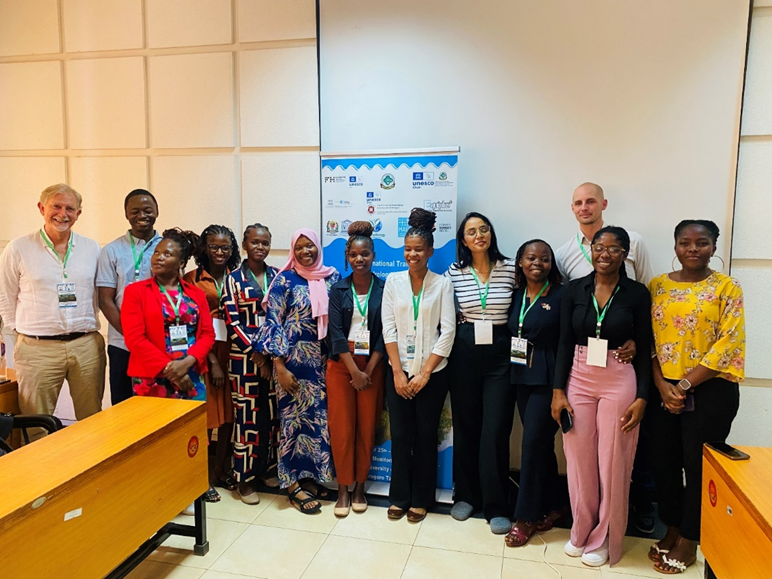
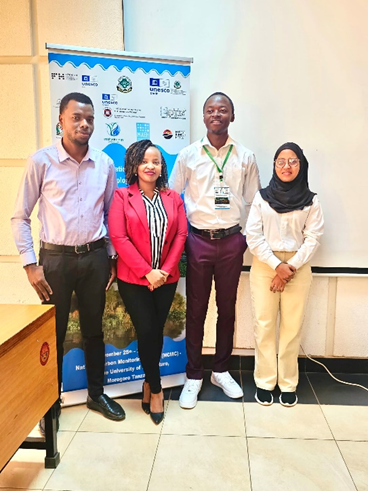
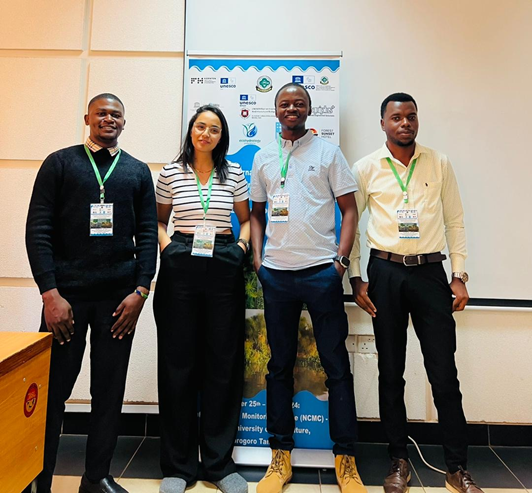
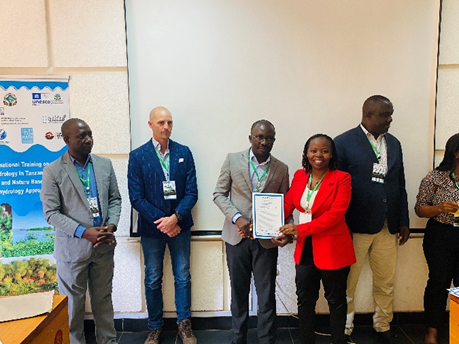
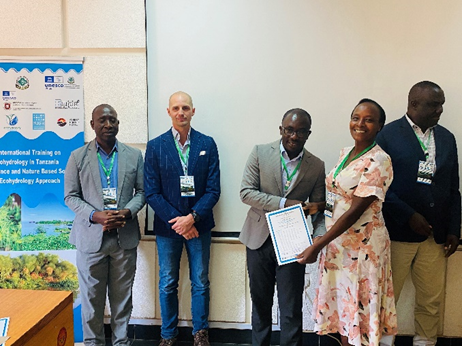
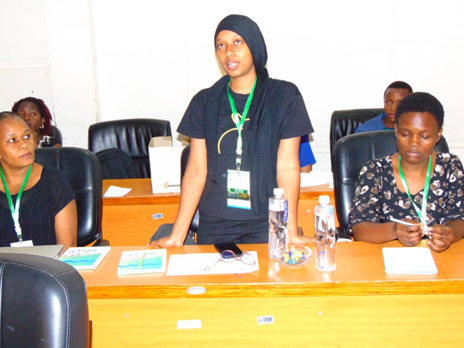
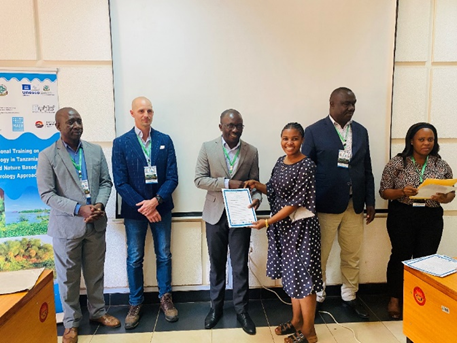
Figure 7: More pictures
Future plans
The next training is scheduled to take place in mid-April 2025 in Tanzania and then in late June 2025 in Bujumbura Burundi.
For more information, contact:
UNESCO Chair on Ecohydrology and Transboundary Water Management, Department of Geography and Environmental Studies, College of Natural and Applied Sciences, Sokoine University of Agriculture, IAGRI Building, Ground Floor, Office No 17, P.O. Box 3038 Morogoro TANZANIA
E-mail: lalika_2mc@sua.ac.tz; makarius.lalika@yahoo.com
WhatsApp: +255 754 201 306




